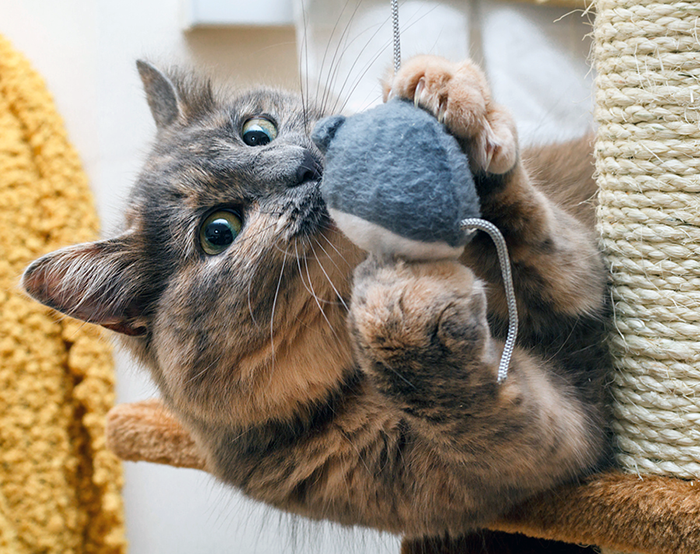A cat that lives to be 20 years old is the approximate equivalent of a 96-year-old person. And, unfortunately, many cats eventually show signs of cognitive dysfunction (like dementia). Up to a third of cats 11 to 14 years old may have cognitive dysfunction. That may rise to 50 percent for cats over 15 years old.
Some of the changes you may notice are easy to live with, but others can be dangerous for your cat and frustrating for you.
After having an examination by your veterinarian to rule out medical issues, you can do several things that may help keep your cat’s mind sharp and reduce symptoms of cognitive dysfunction.
New toys, exercise (like chasing a feather on a wand), and teaching tricks are great ways to improve learning and memory.
Make a point of regularly engaging your cat’s brain starting from when you first bring her home. If your cat’s brain is in good shape to begin with, she’ll be ahead of the game as she ages.
Remember that cats like schedules. Serve meals at the same time, so that she’ll know when to expect them. If you leave food out for her all the time, plan a couple times to give her a special treat that she can look forward to.
Encourage your cat to keep a regular sleep schedule as well. If she is napping more frequently during the day, gently wake her up and carry her around, petting her or try to get her to play. Preventing too many daytime slumbers will make it easier for her to sleep at night and help cut down on the nocturnal wanderings.
Food, water, and litter boxes should be easily accessible for your cat and should always be kept in the same spot. If your cat has difficulty navigating stairs, consider a little ramp for her to use. If she is disoriented or visually impaired, doors and baby gates can keep her confined to a part of the house where she can get to everything she needs and can’t get lost, stuck, or injured.
Your veterinarian may prescribe medications for your cat. Selegiline hydrochloride is approved for cognitive dysfunction in dogs, but some veterinarians use it for cats as well. Fluoxetine and other anti-anxiety medications can help to cut down on behavioral changes due to stress and disorientation. Using cat pheromones may help to keep your cat calm.
Be careful with your choices and discuss them with your veterinarian. Some drugs, like pain medications, anesthetic drugs, and perhaps even supplements containing iron, should be avoided for these cats. Before adding any supplement purported to help with cognitive dysfunction, discuss the product with your veterinarian. Research does not generally support their use at this time.
Behavioral Changes
Signs that indicate dementia include:
- Aggression
- Altered sleep cycles
- Disinterest in food and water
- Disorientation
- Inappropriate elimination
- Irritability
- Loud vocalizing
- No interest in favorite toys
- Reduced interaction with people
- Wandering




